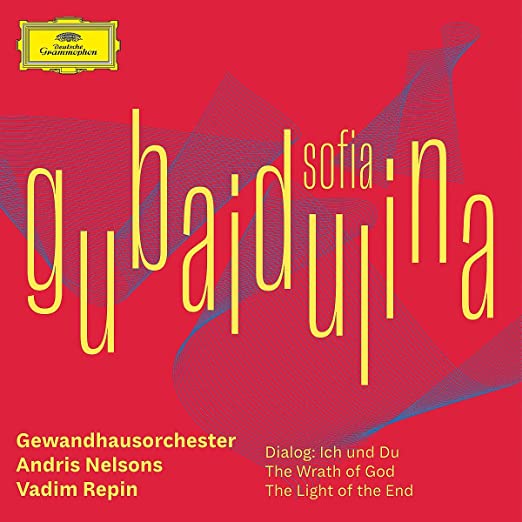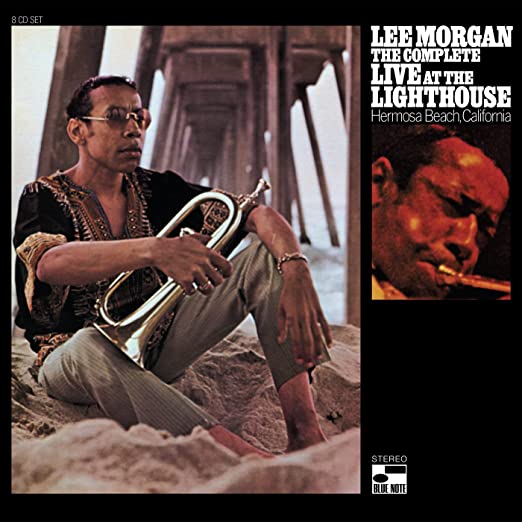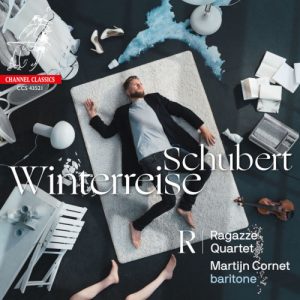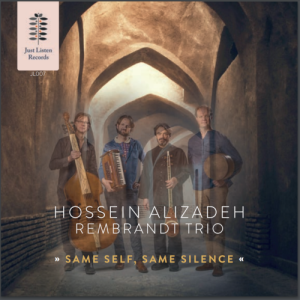
Schubert, Winterreise. Matthias Goerne, baritone. Christoph Eschenbach, piano. Schubert Edition, No. 9. Harmonia Mundi. HMC 902107.
Schubert's Winterreise can bring to mind Haydn's Seven Last Words (for string quarter or chamber orchestra), another hour plus long work focussing essentially on one mood, desolation. The challenge is how to sustain musical interest for that long without much movement. Schubert does it with drama, having the benefit of a more malleable subject, lost love. (Seven Last Words leads inexorably to the cross, so there's not much room for drama!) Winterreise is a dramatic soliloquy, which passes through contrasting states of mind that are all products of romantic desolation. Romantic desolation comes in many colors and can be crossed with hope, melancholy, anger, pain, illusion—subjects of which Schubert is a proven master. So as grim and forlorn as it is, Winterreise never fails to hold our interest, especially if the soloist has the lyrical powers of a Dietrich Fischer-Diskau, Peter Pears—or Matthias Goerne.
This is the ninth and last CD of Goerne's Schubert edition, and the performances by both the soloist and his piano partner, Chistoph Eschenbach, bring it to a strong close. Goerne is versatile and commanding—his deep baritone voice as rich as a fine cello. In some of the best ‘songs' that comprise the work, he is absolutely transporting: he is at his best with the composer's best. Eschenbach has appeared with him on two earlier discs in the series, including the other favorite, Die Schone Mullerin; and while Goerne clearly wanted to share the piano role around a bit in the cycle, Eschenbach would appear to be his favorite. He is wonderfully present but never steps out of his role.
I'll say it once again. This is one of the greatest recording projects of our time. If my memory is not letting me down here, this is the best Goerne has been, and that's saying a very great deal. His considerable vocal power seems under wonderful control—this is most evident in the quieter lyrical songs where we find ourselves entirely in his hands. I can only hope that we realize what an important event this production is before the series becomes just an historical note in recording history.

Sofia Gubaidulina, Repentance. Music for cellos, guitars, piano, double bass, viola. BIS records. BIS 2056. SACD/CD.
BIS favors completism, which makes them invaluable to exploring music lovers. They choose their composers and then let it rip. This is their twenty-third album of the bold and mercurial Russian modernist, Sofia Gubaidulina (b. 1931). Not everything Gubaidulina has written is brilliant: completism doesn't get you that from any composer. But some of it is terrific, some fascinating, and none boring.
Repentance , for cello, three guitars, and double bass (2008); Serenade for solo guitar (1960); Piano Sonata (1965); Sotto Voce for viola, double bass, and two guitars (2010/2013). It takes a couple of hearings to get on board, but I've just finished my third and I'm on.
This album is the composer in her romper room, as you might guess from the unusual collection of instruments, though the Piano Sonata is actually the biggest romp. Also, her use of guitars is a delight, her approach to them free and indulgent. Don't stay away if you're not a fan of classical guitar, which I generally am not. Sotto Voce sounds to me like a zany masterpiece. The guitars nod to Spain and then, in the company of a viola and double bas, move into revelatory new territory.
I find Guibaidula unique among her contemporaries. She has a hint of Schnittke in her when she's feeling rascally. She can be starkly spiritual in ways that make Pärt seem new agey. Ultimately, she doesn't sound like anyone but herself, which may the key to her stature, which at age 84 remains to be seen. Having just written this, I note major contemporary violinist Gidon Kremer's remarks in the CD booklet: "With Gubaidulina's way of composing, it is less a matter of technique, or of a particular school to which he music can be said to belong, and far more a question of an individual voice that is unique and, for that very reason, new."
This CD is a fine introduction to her work.

Shostakovich. Symphony No. 13 ‘Babi Yar.' Royal Liverpool Philharmonic Orchestra, Vasily Petrenko. Naxos 8. 573218.
Here we have a second great recording series coming to a close. This final disc in Vasily Petrenko's Shostakovich symphony cycle affords me one final opportunity to praise the series as a whole and to try to say something particular about its distinction. I have five sets of Shostakovich's String Quartets—the Fitzwilliam, Borodin, Emerson, Alexander, and the Sorel. All but one take the music furious and fearsome in varying degrees. They are all quite fine or they wouldn't be here any longer. The Sorel Quartet—four women—seek out instead the poetry in the music, backing off a bit on fury and fear, thereby infuriating many of the composer's fans but pleasing some of the rest of us a great deal. Petrenko and the Royal Liverpool Philharmonic take more of a Sorel approach to the symphonies than the others I've heard (not many). Petrenko makes this music, so often dismissed as bombast, more interesting, intriguing even. There is plenty of high energy and éclat here when it's called for but Petrenko doesn't let it dominate. For him, intensity can be a subtle as well as bold thing.
As I've written in reviews of earlier CD's in this series, Petrenko is the first conductor who has been able to persuade me that Shostakovich's symphonies are major music, worthy of standing beside Mahler's. At least. Russia is a long way from Vienna and fashion has favored the latter; but recordings like Petrenko's may begin to turn the tide the other way. I did not really begin to appreciate Russian music until I heard Mussorgsky's Boris Godunov, which is a musical universe unto itself. Shostakovich's Symphony No. 13 is full of Mussorgsky's spirit—thanks in no small part to its stunningly good bass soloist, young Muscovite Alexander Vinogradov, who recalls Boris Christoff, the great Boris.
Like Symphony No. 12, No 13 is a choral symphony (scored for 40-100 basses!) with text by the Russian liberal poet, Yevgeny Yevtushenko, addressing the history of anti-semitism in Russia. In addition to the basses, the score calls for a great many woodwinds and brass and 64-82 strings. The work as a whole is varied in dynamics and mood. I find its adagios movements the most compelling, though I'm sure their eloquence gains from the contrast provided by the faster, louder movements around them. I played the final allegretto three times on first hearing.
So...you can jump into this cycle now with Symphony No. 13. Or you can wait impatiently for the box set surely to come in 2015. Naxos CD's are and have always been the greatest musical value on earth, so I see no compelling reason to wait.
Equipment used for this audition: Resolution Audio Cantata CD player, Crimson 710 preamplifier and 640 mono-block amplifier, Tocaro 42 and Jean Marie Reynaud Orféo Supreme II loudspeakers, Crimson cables, Volex power cords.
Bob Neill is a former equipment reviewer for Enjoy the Music and Positive Feedback. Since 2004, he has been proprietor of Amherst Audio in Western Massachusetts, which sells equipment from Audio Note (UK), Blue Circle (Canada), Crimson (UK), Jean Marie Reynaud (France), Resolution Audio (US), and Tocaro (Germany).






































